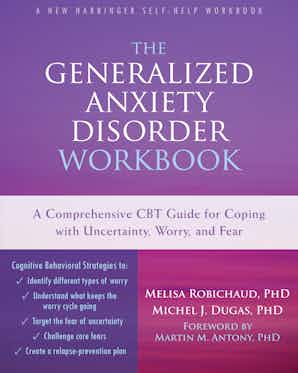If you’ve ever used cognitive-behavioral strategies like decatastrophizing, probability estimation, or exposure to help generalized anxiety disorder (GAD) clients cope with their excessive worries, you might have found yourself getting a bit frustrated. Although these strategies are often helpful in allowing clients to better understand the realistic threat of a particular worry (e.g., being ten minutes late for an appointment might not be so terrible), most clients come to their next session with a fresh new batch of excessive worries. As a consequence, therapists often end up chasing a moving target, wherein they are constantly working with their clients to manage yet another set of worries that seem to arise at each session.
One of the main problems with targeting GAD’s excessive worry is that the treatment focus is on the symptom rather than on what underlies it. Several decades of research has shown one of the main reasons GAD clients worry excessively about daily life situations is because of their intolerance to the inherent uncertainty present in daily life. Clients with GAD tend to hold negative beliefs about the likelihood and severity of threat in uncertain situations, and underestimate their ability to cope with anticipated negative outcomes. Worry can therefore be construed as an attempt to avoid or eliminate uncertainty by mentally planning and preparing for every eventuality.
With this in mind, therapists can target the fear of uncertainty in treatment, rather than engaging in strategies aimed at addressing each particular worry. This can be accomplished by conducting behavioral experiments where clients deliberately refrain from engaging in uncertainty-driven safety behaviors (e.g., excessive preparation, information, and reassurance seeking) and observing the outcome. In this manner, GAD clients can directly test their negative beliefs about uncertainty: Do uncertain situations always turn out negative? If so, is it as bad as expected, and are they able to cope with the outcome? Through direct experience, GAD clients can learn to change their beliefs about the threat of uncertainty and ultimately reduce their worry (without ever targeting their actual worries).
 Melisa Robichaud, PhD, is a clinical psychologist and cofounder of the Vancouver CBT Centre. She holds adjunct clinical faculty and clinical associate positions in psychology and psychiatry at the University of British Columbia and Simon Fraser University. Robichaud specializes in the treatment of anxiety with an emphasis on generalized anxiety disorder (GAD), and is on the scientific advisory board of AnxietyBC. For over a decade, she has provided workshops and training to both mental health professionals and the public on the treatment of GAD. She is an author of The Generalized Anxiety Disorder Workbook.
Melisa Robichaud, PhD, is a clinical psychologist and cofounder of the Vancouver CBT Centre. She holds adjunct clinical faculty and clinical associate positions in psychology and psychiatry at the University of British Columbia and Simon Fraser University. Robichaud specializes in the treatment of anxiety with an emphasis on generalized anxiety disorder (GAD), and is on the scientific advisory board of AnxietyBC. For over a decade, she has provided workshops and training to both mental health professionals and the public on the treatment of GAD. She is an author of The Generalized Anxiety Disorder Workbook.


